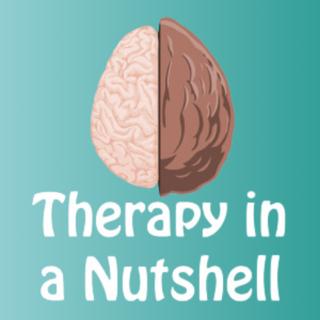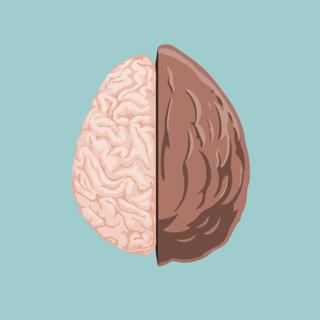
Fight Depression And Burnout in 2 Minutes a Day - 3 Good Things Activity
You can fight depression and burnout in just a few minutes a day. Your brain is so much better at focusing on survival than it is at focusing on being happy, and it's because of this fact that your brain is constantly scanning for threats, trying to pick out or notice anything bad, dangerous, or negative instead of looking for the positive or dwelling on the good things that happen in your life. Your brain’s default setting is to keep you alive by really paying attention to anything threatening or dangerous. This focus on survival was imperative to our ancestors, but in today's world, if left unchecked, it can lead to stress, burnout, and depression. But I have good news. There is a simple way to combat this challenge of focusing on the negative, and to turn up the volume of the positive things in your life. In this video, I'll teach you how to fight burnout and feel happier. Looking for affordable online counseling? My sponsor BetterHelp connects you to a licensed professional for $65/week. Try it now for 10% off https://betterhelp.com/therapyinanuts... Learn more in one of my in-depth mental health courses: https://courses.therapyinanutshell.com/?utm_source=podcast&utm_medium=01212021 Support my mission on Patreon: https://www.patreon.com/therapyinanut... Sign up for my newsletter: https://www.therapynutshell.com Check out my favorite self-help books: https://kit.co/TherapyinaNutshell/bes... Therapy in a Nutshell, and the information provided by Emma McAdam, is solely intended for informational and entertainment purposes and is not a substitute for advice, diagnosis, or treatment regarding medical or mental health conditions. Although Emma McAdam is a licensed marriage and family therapist, the views expressed on this site or any related content should not be taken for medical or psychiatric advice. Always consult your physician before making any decisions related to your physical or mental health. If you are in crisis please contact the National Suicide Prevention Hotline at: https://suicidepreventionlifeline.org/ or 1-800-273-TALK (8255), or your local emergency services. Copyright Therapy in a Nutshell, LLC ---- Music licensed from www.Bensound.com or Artlist.io Images from Freepik.com (premium license), Pixabay, or Wikimedia commons
21 Jan 20215min

Creating an Environment where Healing Mental Illness is Possible: A Treatment Team Approach
In this video I’m going to talk about how you can create an environment where healing is possible and increase your chances of beating your mental illness. And while most people don’t have the opportunity to go to residential treatment if they need it, there is one thing that I’ve taken from my experience there that helps me be a better therapist now than I was before. And that’s taking a team approach to treatment. Sign up for my newsletter: https://www.therapynutshell.com Thanks BetterHelp for sponsoring the video: BetterHelp- Professional, Affordable Online Counseling starting at around $65 a week https://www.betterhelp.com/therapyina... Learn more in one of my in-depth mental-health classes: https://courses.therapyinanutshell.com/?utm_source=podcast&utm_medium=01192021 Check Out My Favorite Books for Mental Health: https://kit.co/TherapyinaNutshell/bes... Music licensed from www.Bensound.com or Artlist.io Images from Freepik.com (premium license), Pixabay, or Wikimedia commons Therapy in a Nutshell, and the information provided by Emma McAdam, is solely intended for informational and entertainment purposes and is not a substitute for advice, diagnosis, or treatment regarding medical or mental health conditions. Although Emma McAdam is a licensed marriage and family therapist, the views expressed on this site or any related content should not be taken for medical or psychiatric advice. Always consult your physician before making any decisions related to your physical or mental health. If you are in crisis please contact the National Suicide Prevention Hotline at: https://suicidepreventionlifeline.org/ or 1-800-273-TALK (8255), or your local emergency services. Copyright Therapy in a Nutshell, LLC
19 Jan 202113min

Change the World with One Skill: World Mental Health Day Find a Way #WithMe
Hello everyone, Today is World Mental Health Day. Right now around a billion people experience a mental illness or a substance abuse disorder and depression is the leading cause of disability worldwide. But the solution sometimes seems overwhelming. So it’s needless to say that mental Illness is a big problem for many people. And the causes are complex, from biology to experience to how we think and act, and in my opinion depression and anxiety are often caused by a lot of tiny little thoughts or behaviors that we don’t even notice, but over time these pile up. But the research is clear, most mental illness is treatable, we can change how we feel, we can improve mental health and fight depression and anxiety by changing how we think and changing how we act and seeking professional and medical support. Sign up for my newsletter: https://www.therapynutshell.com Thanks BetterHelp for sponsoring the video: BetterHelp- Professional, Affordable Online Counseling starting at around $65 a week https://www.betterhelp.com/therapyina... Learn more in one of my in-depth mental health courses: https://courses.therapyinanutshell.com/?utm_source=podcast&utm_medium=01122021 Check Out My Favorite Books for Mental Health: https://kit.co/TherapyinaNutshell/bes... Music licensed from www.Bensound.com or Artlist.io Images from Freepik.com (premium license), Pixabay, or Wikimedia commons Therapy in a Nutshell, and the information provided by Emma McAdam, is solely intended for informational and entertainment purposes and is not a substitute for advice, diagnosis, or treatment regarding medical or mental health conditions. Although Emma McAdam is a licensed marriage and family therapist, the views expressed on this site or any related content should not be taken for medical or psychiatric advice. Always consult your physician before making any decisions related to your physical or mental health. If you are in crisis please contact the National Suicide Prevention Hotline at: https://suicidepreventionlifeline.org/ or 1-800-273-TALK (8255), or your local emergency services. Copyright Therapy in a Nutshell, LLC
12 Jan 20215min

How to Stop Worrying About the Future
In this video you’re going to learn what to do when your brain just won’t shut up with all the worries about what’s going to happen in the future. I’m going to teach you one antidote for when you’re stuck ruminating on your fears, and I’ll teach you why you should never worry in your head. A Little worry is ok. Worry serves a function. Beneficial worry prompts action, it can help us plan for the future by thinking through possible problems and their solutions. But compulsive worry makes us feel sick and freeze up When we imagine danger our body has the exact same physiological reaction as if there was real danger present. That’s why your body pumps out adrenaline when you’re safe at home watching a scary movie. And when we’re stuck in chronic worry, that can make us so anxious that we get sick or can’t function. Looking for affordable online counseling? My sponsor BetterHelp connects you to a licensed professional for $65/week. Try it now for 10% off https://betterhelp.com/therapyinanutshell Learn more in one of my in-depth mental health courses: https://courses.therapyinanutshell.com/?utm_source=podcast&utm_medium=01072021 Support my mission on Patreon: https://www.patreon.com/therapyinanutshell Sign up for my newsletter: https://www.therapynutshell.com Check out my favorite self-help books: https://kit.co/TherapyinaNutshell/best-self-help-books Therapy in a Nutshell, and the information provided by Emma McAdam, is solely intended for informational and entertainment purposes and is not a substitute for advice, diagnosis, or treatment regarding medical or mental health conditions. Although Emma McAdam is a licensed marriage and family therapist, the views expressed on this site or any related content should not be taken for medical or psychiatric advice. Always consult your physician before making any decisions related to your physical or mental health. If you are in crisis please contact the National Suicide Prevention Hotline at: https://suicidepreventionlifeline.org/ or 1-800-273-TALK (8255), or your local emergency services. Copyright Therapy in a Nutshell, LLC
7 Jan 202116min

Mental Filtering: Why you may only notice the Negative
Mental filtering is the cognitive distortion where we only see one aspect of a situation, usually the negative side of it when it comes to depression or anxiety. You focus on the negative and disregard or filter out all the positive. You pick out a single negative detail and hyperfocus on this instead of everything else going on. If you can’t see anything positive, then your thoughts are lying to you. Mental filtering makes us more anxious, but anxiety makes us mental filter more- because anxiety attunes our brain to threats, making it so that we’re more likely to notice the bad. Mental filtering makes us more depressed, when we only notice the bad, life is depressing. But when we feel crappy, when we feel depressed, we’re more likely to mental filter. Sign up for my Newsletter: https://www.therapynutshell.com Thanks BetterHelp for sponsoring the video: BetterHelp- Professional, Affordable Online Counseling starting at around $65 a week https://www.betterhelp.com/therapyina... Learn more in one of my in-depth mental-health courses: https://courses.therapyinanutshell.com/?utm_source=podcast&utm_medium=01052021 Check Out My Favorite Books for Mental Health: https://kit.co/TherapyinaNutshell/bes... Music licensed from www.Bensound.com or Artlist.io Images from Freepik.com (premium license), Pixabay, or Wikimedia commons Therapy in a Nutshell, and the information provided by Emma McAdam, is solely intended for informational and entertainment purposes and is not a substitute for advice, diagnosis, or treatment regarding medical or mental health conditions. Although Emma McAdam is a licensed marriage and family therapist, the views expressed on this site or any related content should not be taken for medical or psychiatric advice. Always consult your physician before making any decisions related to your physical or mental health. If you are in crisis please contact the National Suicide Prevention Hotline at: https://suicidepreventionlifeline.org/ or 1-800-273-TALK (8255), or your local emergency services. Copyright Therapy in a Nutshell, LLC
5 Jan 202115min

How Loneliness Affects the Immune System
Loneliness impacts the immune system, mental health, and physical health in dramatic ways. But you can counteract its effects through intentional human connection. Loneliness contributes to depression, anxiety, heart disease, a weakened immune system, cognitive decline, and other mental and physical health problems, but you can find ways to connect with others in a way that strengthens your physical health, even during coronavirus. Looking for affordable online counseling? My sponsor, BetterHelp, connects you to a licensed professional for $65/week. Try it now for 10% off https://betterhelp.com/therapyinanuts... Support my mission on Patreon: https://www.patreon.com/therapyinanut... Learn more in one of my in-depth mental health courses: https://courses.therapyinanutshell.com/?utm_source=podcast&utm_medium=12292020 Sign up for my newsletter: www.therapynutshell.com Check out my favorite self-help books: https://kit.co/TherapyinaNutshell/bes... Therapy in a Nutshell, and the information provided by Emma McAdam, is solely intended for informational and entertainment purposes and is not a substitute for advice, diagnosis, or treatment regarding medical or mental health conditions. Although Emma McAdam is a licensed marriage and family therapist, the views expressed on this site or any related content should not be taken for medical or psychiatric advice. Always consult your physician before making any decisions related to your physical or mental health. If you are in crisis please contact the National Suicide Prevention Hotline at: https://suicidepreventionlifeline.org/ or 1-800-273-TALK (8255), or your local emergency services. Copyright Therapy in a Nutshell, LLC
29 Dec 202015min

Anxiety, Worries and What if’s-Rewiring Anxiety through Intentional Risk Assessment- Acceptable Risk
So here’s another of the most common questions I get on my “Rewiring the Anxious Brain” video- People asked “What if the dog bites you?” Now in that video I was explaining how when you avoid something it makes your anxiety go up, and this is really harmful when you avoid something that feels dangerous, but is actually safe- like public speaking, taking a test, or asking for a raise. So I used the example of being afraid of dogs and then explained how gradual exposure can help you overcome that fear by gradually spending time with dogs. But of course, when making a video about anxiety, the anxious people watching the video are going to say- but how can I do that, what if the dog bites you? Many people with anxiety focus on the worst-case scenario, instead of focusing on the potential for growth and healing. And that’s because when your brain is in anxiety mode, it’s attuned to threats, it only notices and pays attention to the potential dangers around you. But dogs can actually be dangerous. So when you’re in anxiety mode the 1 in 1,000 chance of being bit by a family’s pet dog feels like a serious, immediate, most likely occurrence. In Anxiety mode our brain is going to assume the worst about so many things- “What if they all hate me?” “What if I get Covid from my groceries?” “What if the car swerves into my lane?” It’s so easy to get wrapped up in all the “What-ifs” that you completely lose sight of your goals. Like overcoming anxiety, or visiting your son who has a dog. But there are some practical steps you can take to manage your brilliantly anxious brain instead of letting anxiety run your life. First realize that your brain’s most natural job is to “prevent dying” to keep you from bad things happening. And unlike other mammals, that are mostly instinctual about these things, running from an immediate threat like a tiger, and then relaxing when the threat is gone. Our brain has the ability to imagine danger in the future, remember danger in the past, and that makes us feel like we’re in danger in the present moment. But just because our brain is really good at imagining dangers, doesn’t mean that avoiding those fears is the way for us to live a good, happy life. I think most people with anxiety can see how feeling anxious all the time and avoiding stuff is making their lives worse… Thanks BetterHelp for sponsoring the video: BetterHelp: Professional, Affordable Online Counseling starting at around $65 a week https://www.betterhelp.com/therapyinanutshell Learn more in one of my in-depth mental health courses: https://courses.therapyinanutshell.com/?utm_source=podcast&utm_medium=12282020 Support my mission on Patreon: https://www.patreon.com/therapyinanutshell Sign up for my newsletter: https://www.therapynutshell.com Check out my favorite self-help books: https://kit.co/TherapyinaNutshell/best-self-help-books Therapy in a Nutshell, and the information provided by Emma McAdam, is solely intended for informational and entertainment purposes and is not a substitute for advice, diagnosis, or treatment regarding medical or mental health conditions. Although Emma McAdam is a licensed marriage and family therapist, the views expressed on this site or any related content should not be taken for medical or psychiatric advice. Always consult your physician before making any decisions related to your physical or mental health. If you are in crisis please contact the National Suicide Prevention Hotline at: https://suicidepreventionlifeline.org/ or 1-800-273-TALK (8255), or your local emergency services. Copyright Therapy in a Nutshell, LLC
28 Dec 202019min

How to Get Motivated and Stay Motivated
Knowing how to get motivated is really important. How to stay motivated is even more important There are tons of videos teaching tips and tricks and rah rah motivation, but in this video I’m going to teach you how your brain works so you understand the principle behind how to get motivated and how to stay motivated. You’re going to learn how dopamine- the neurotransmitter of reward and motivation works in your brain and 4 simple things you can do to get motivated and stay that way. Looking for affordable online counseling? My sponsor, BetterHelp, connects you to a licensed professional for $65/week. Try it now for 10% off https://betterhelp.com/therapyinanutshell Learn more in one of my in-depth mental health courses: https://courses.therapyinanutshell.com/?utm_source=podcast&utm_medium=12262020 Support my mission on Patreon: https://www.patreon.com/therapyinanutshell Sign up for my newsletter: https://www.therapynutshell.com Check out my favorite self-help books: https://kit.co/TherapyinaNutshell/best-self-help-books Therapy in a Nutshell, and the information provided by Emma McAdam, is solely intended for informational and entertainment purposes and is not a substitute for advice, diagnosis, or treatment regarding medical or mental health conditions. Although Emma McAdam is a licensed marriage and family therapist, the views expressed on this site or any related content should not be taken for medical or psychiatric advice. Always consult your physician before making any decisions related to your physical or mental health. If you are in crisis please contact the National Suicide Prevention Hotline at: https://suicidepreventionlifeline.org/ or 1-800-273-TALK (8255), or your local emergency services. Copyright Therapy in a Nutshell, LLC ---- Music licensed from www.Bensound.com or Artlist.io Images from Freepik.com (premium license), Pixabay, or Wikimedia commons
26 Dec 202017min






















